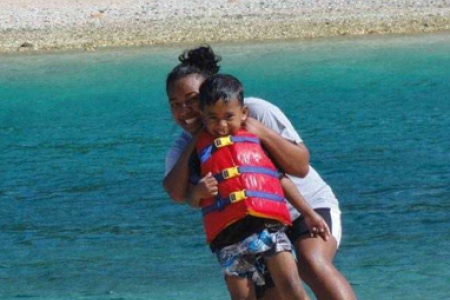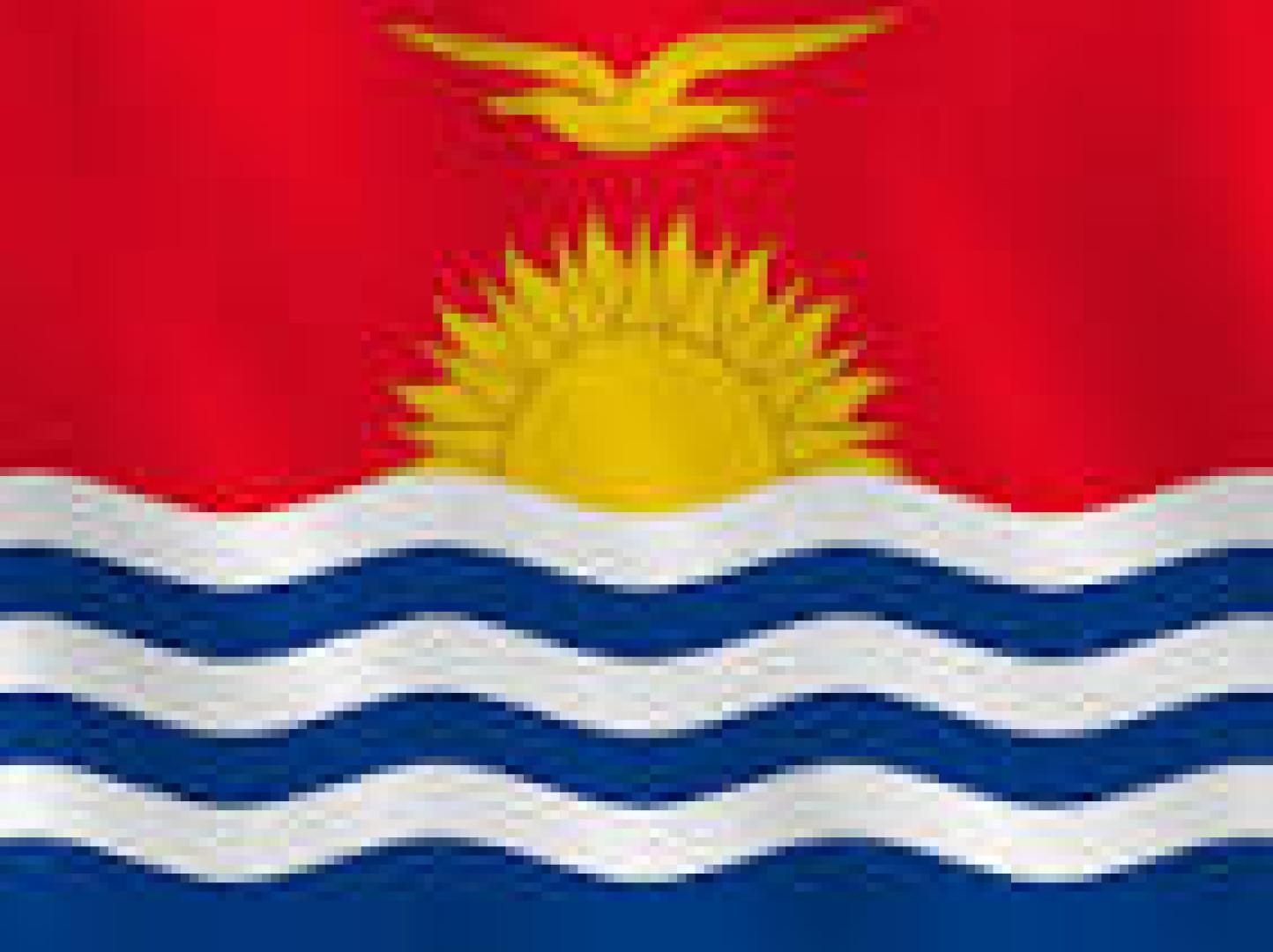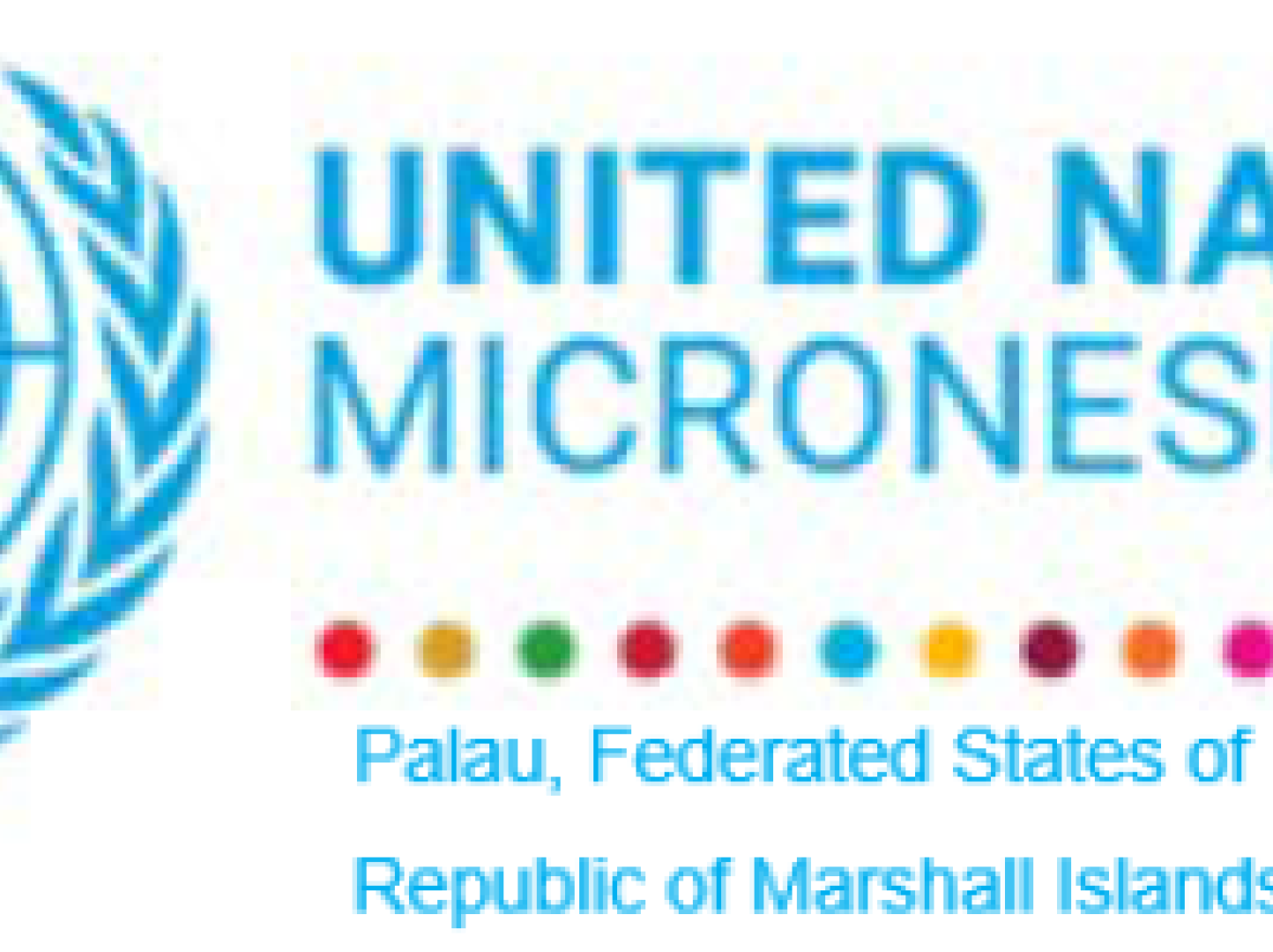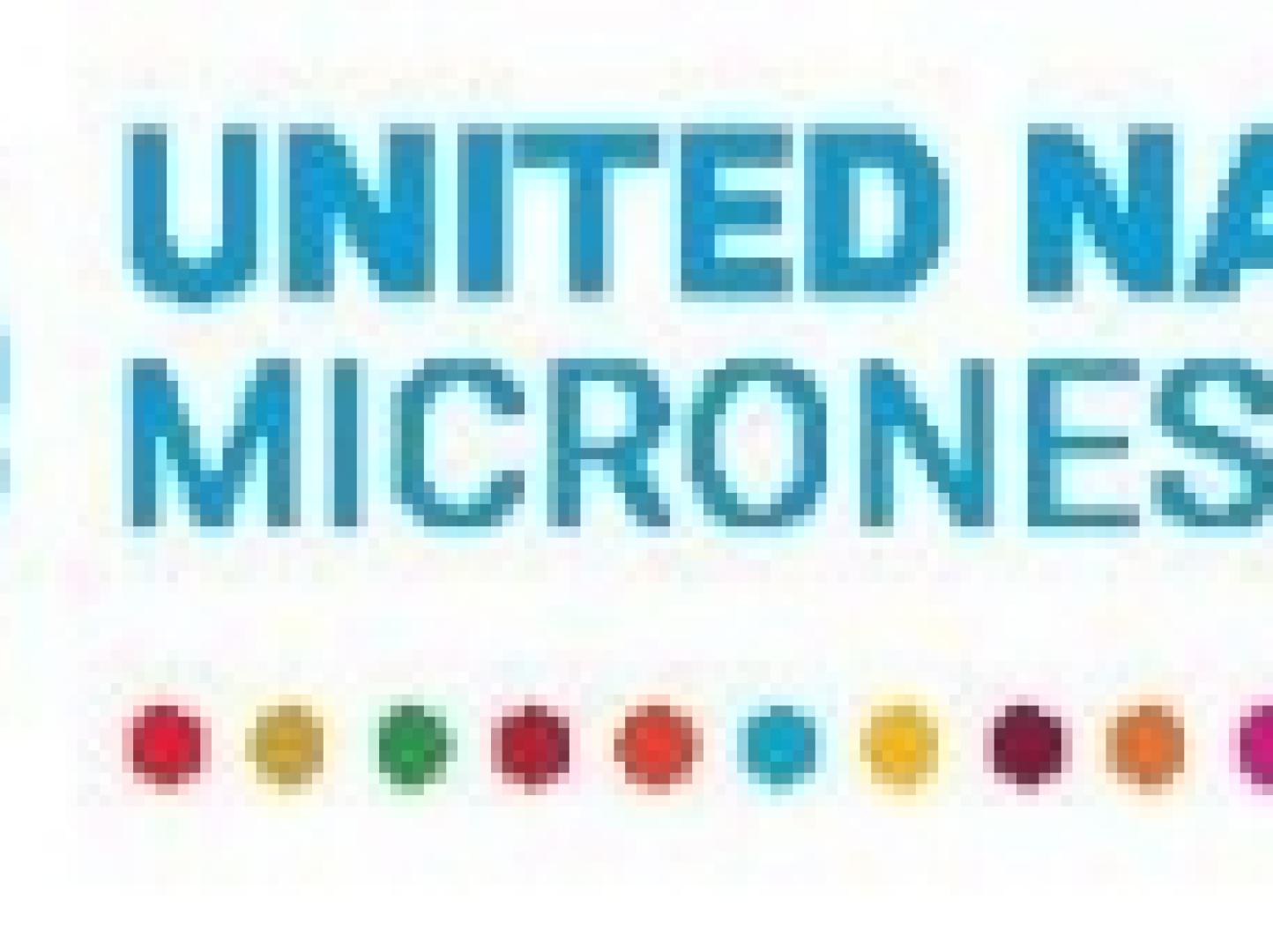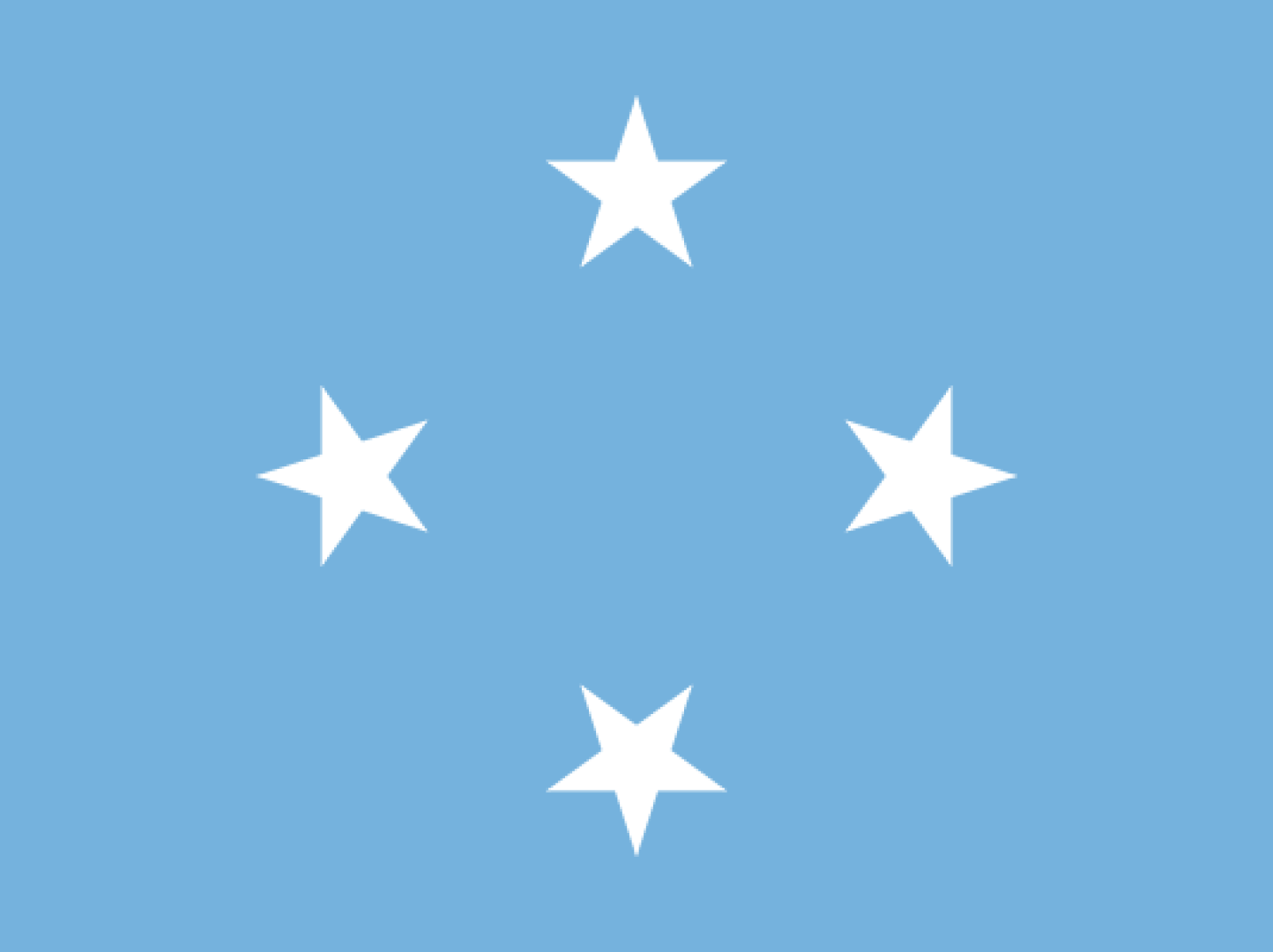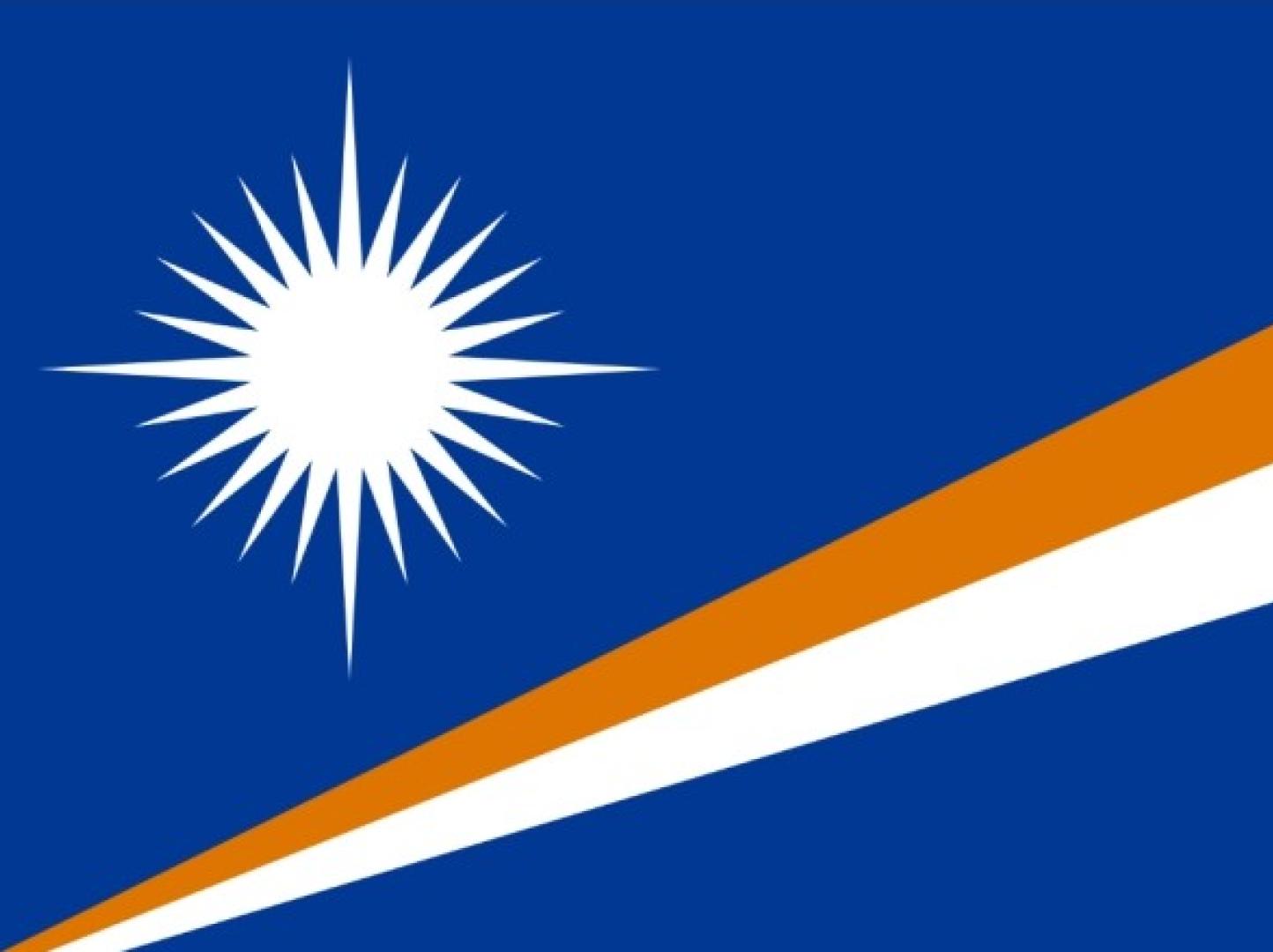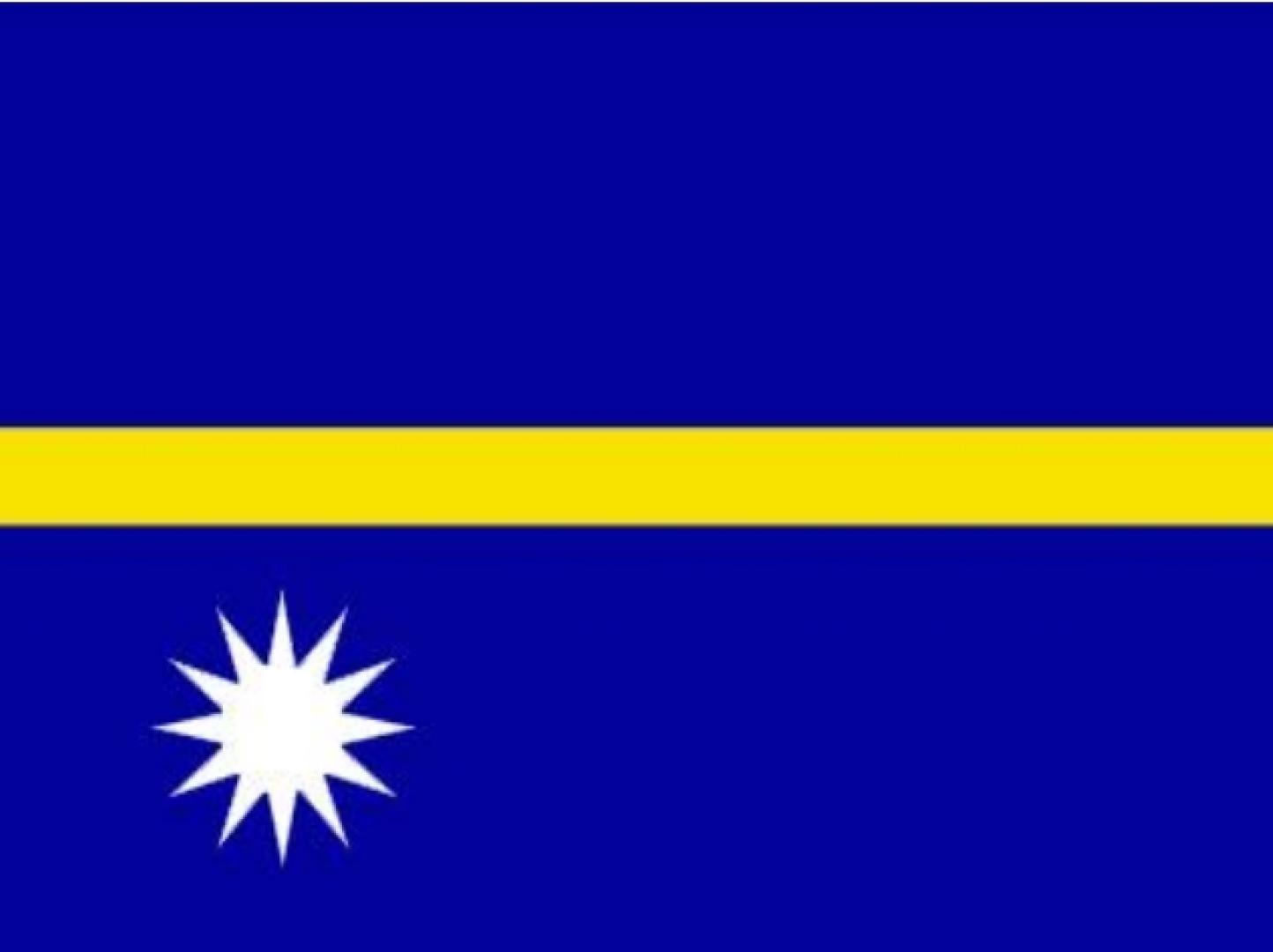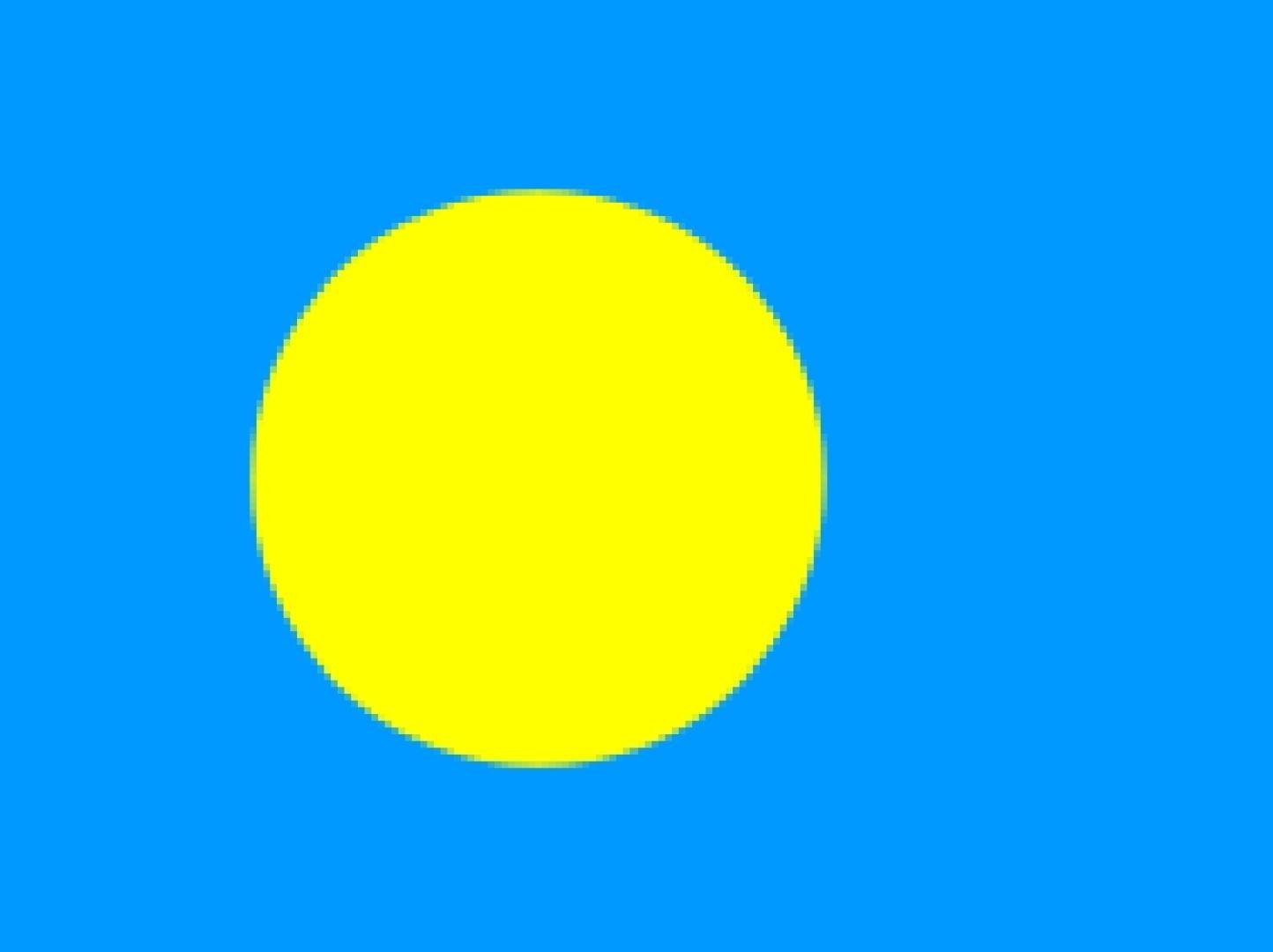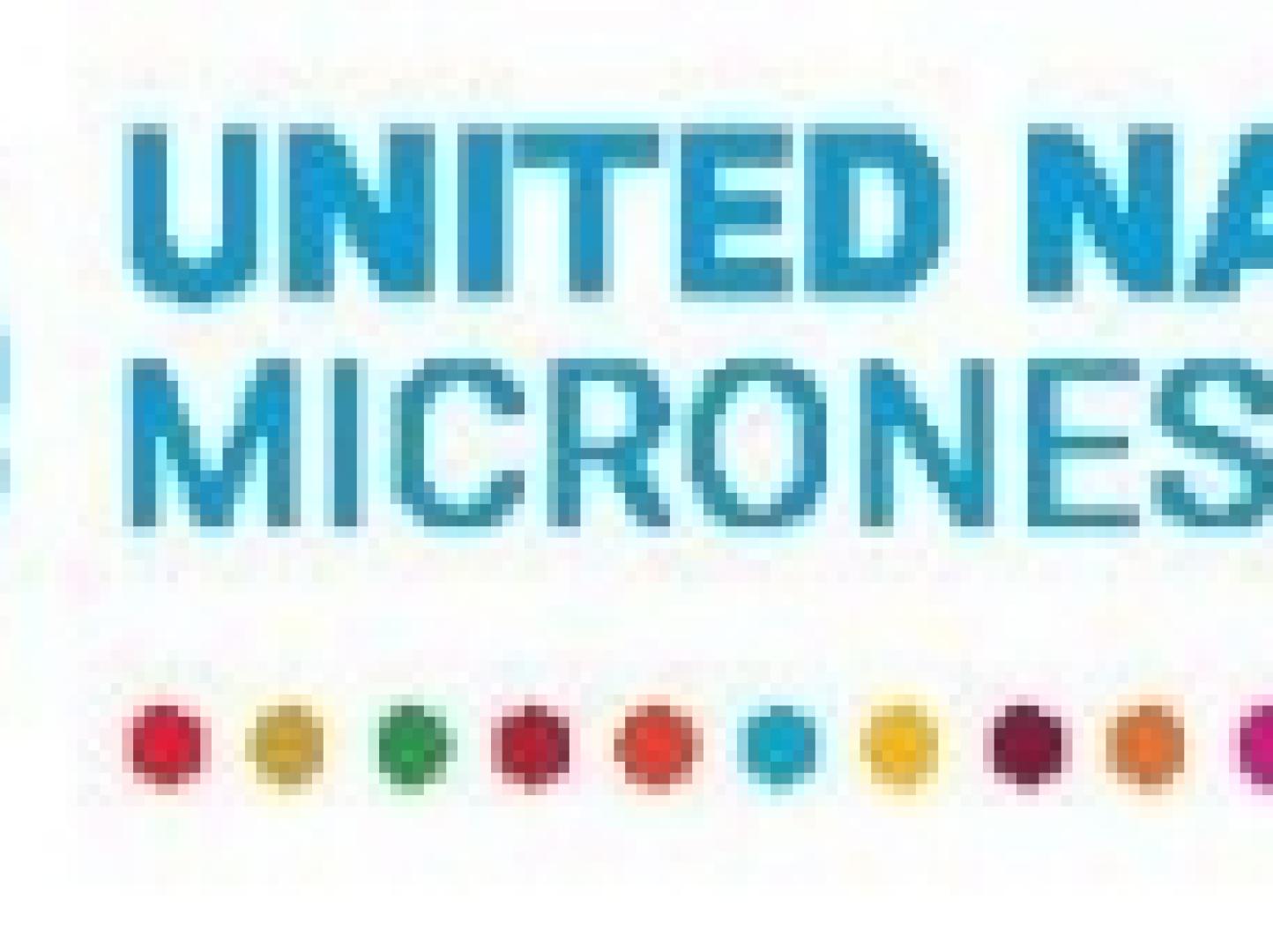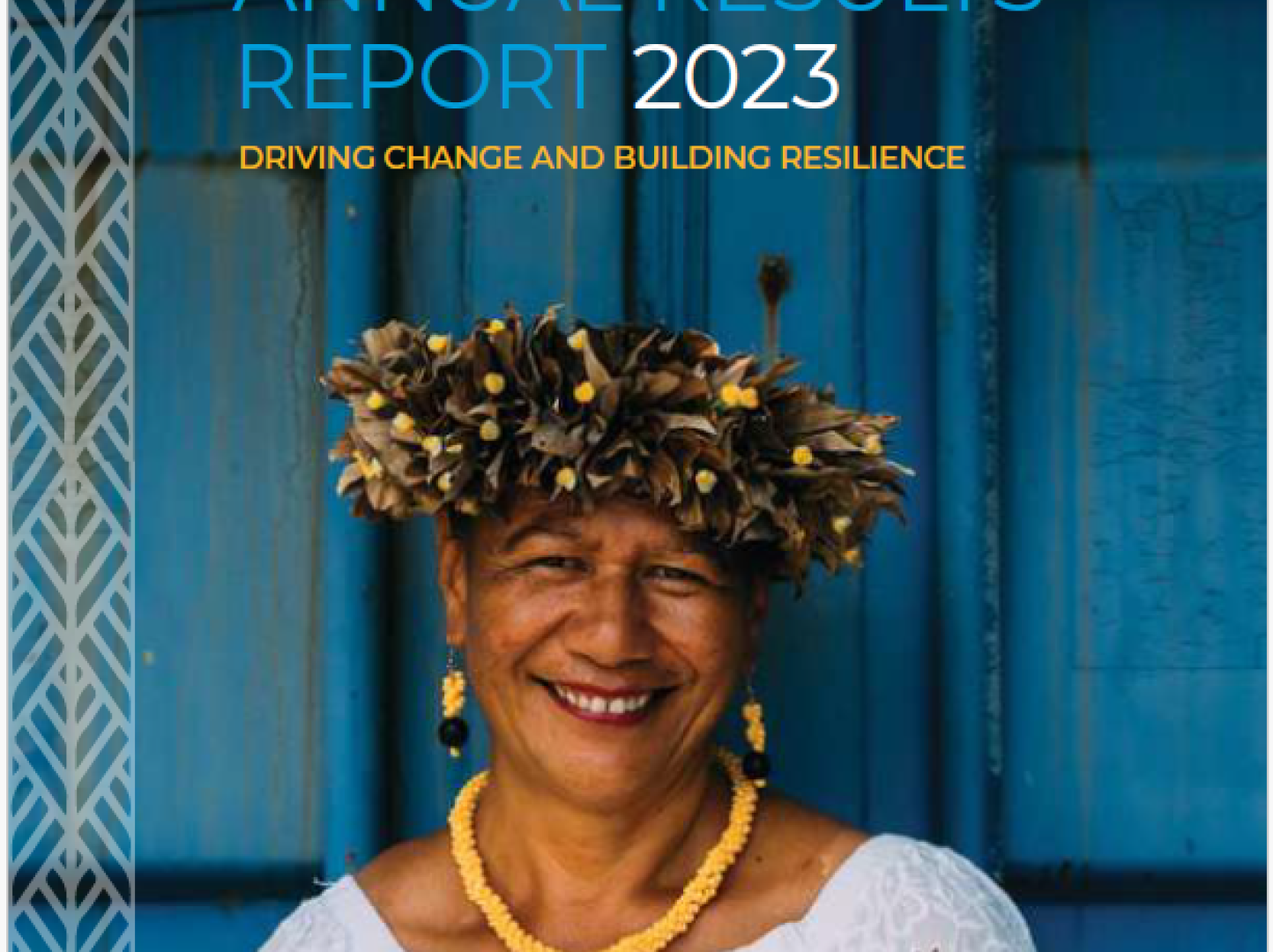Latest
Press Release
11 April 2025
Tonoas Smart Island Digital Hub Officially Launched, Marking a New Era of Digital Transformation in Micronesia
Learn more
Press Release
11 April 2025
A Milestone for Justice: Spotlighting the Importance of Judicial Well-being
Learn more
Press Release
07 March 2025
THE SECRETARY-GENERAL -- MESSAGE FOR INTERNATIONAL WOMEN’S DAY 2025
Learn more
Latest
The Sustainable Development Goals in Micronesia
The Sustainable Development Goals are a global call to action to end poverty, protect the earth's environment and climate, and ensure that people everywhere can enjoy peace and prosperity. These are the goals the UN is working on in Micronesia.
Press Release
07 March 2025
UN Resident Coordinator for Micronesia Tapan Mishra - International Women's Day 2025 Speech
For over 100 years, International Women’s Day has celebrated the achievements of women and called for action toward gender equality. This year is particularly significant as we mark the 30th anniversary of the Beijing Platform for Action, a landmark global commitment to women’s empowerment. This year’s theme, “For ALL Women and Girls: Rights. Equality. Empowerment.”, calls for action that can unlock equal rights, power and opportunities for all and a feminist future where no one is left behind. Central to this vision is empowering the next generation—youth, particularly young women and adolescent girls—as catalysts for lasting change. In the Pacific, we have seen strong regional commitments—from the Pacific Leaders’ Gender Equality Declaration to the 2050 Blue Pacific Strategy—but we must ensure these commitments translate into real change. Women’s leadership is crucial to achieving sustainable development, yet their representation in Micronesian parliaments remains low, ranging from 9% in Kiribati to 19% in Palau. Barriers include cultural norms, financial constraints, and restrictive policies. Governments, civil society, and the UN must work together to implement policies that support women’s leadership and boost representation. Women are at the frontlines of climate change, yet they lack access to decision-making and climate financing. From rising sea levels to extreme weather, the climate crisis threatens their livelihoods. Investing in women-led solutions is investing in a resilient, sustainable future. Women face economic inequalities and a double burden—working for wages while also performing unpaid care work at home. This work sustains our families and economies but remains undervalued. We need affordable childcare, parental leave, and social protection to support women and create more equitable societies. No one should live in fear. Yet, gender-based violence remains a crisis in the Pacific. Survivors face stigma, weak legal protections, and lack of support. Ending violence requires stronger laws, survivor-centered services, and collective action from governments, communities, and institutions. Equality is not just a goal—it is an urgent necessity. Micronesia has long been guided by traditions of unity and solidarity—values that must now drive real progress for women’s rights and equality for all. Together, let’s turn commitments into action. Happy International Women’s Day! , filtered_html
1 of 5
Press Release
07 March 2025
Joint UN Statement for International Women’s Day 2025
International Women’s Day this year is doubly significant, as it is a landmark celebration of the 50th anniversary since the UN’s commemoration of the event. It is also the 30th anniversary of the Beijing Platform for Action, a key global policy document to progress priorities for gender equality, emerging from the historic UN 4th World Conference on Women in Beijing, in 1995. This year’s International Women’s Day theme “For ALL Women and Girls: Rights. Equality. Empowerment” recognizes and upholds the rights of women and girls in all their diversity. It aligns with key frameworks such as the Beijing Declaration and Platform for Action, the Convention on the Elimination of All Forms of Discrimination against Women (CEDAW), the Sustainable Development Goals (particularly Goal 5), and the UN system-wide Gender Equality Acceleration Plan.Despite gains since the Beijing Platform for Action was adopted in 1995, globally, one in 10 women still live in poverty; over 2.7 billion women are legally restricted from having the same choice of jobs as men; nearly 60 percent of women’s employment is in the informal economy, and in low-income countries, it is more than 90 percent; around 257 million women who want to avoid pregnancy are not using safe, modern methods of contraception; and, one woman or girl is killed every 10 minutes by their intimate partner or family member. Furthermore, nearly half of the world’s 281 million international migrants are women and a shocking 71 percent of women and girls are victims of human trafficking worldwide.In the Pacific, we have seen strong commitments made at the regional level through the Pacific Leaders’ Gender Equality Declaration, the Pacific Platform for Action for Gender Equality and Women’s Human Rights, and the 2050 Blue Pacific Strategy.While there have been decades of progress to advance sexual and reproductive health and rights, some Pacific countries have seen an increase in the Adolescent Birth Rate or teenage pregnancy and child marriage, particularly of girls—with adverse effects on the health, education and well-being that span their life course. Furthermore, Pacific Island Countries have the lowest levels of women’s political representation in the world - at just 5.8 percent.Gender inequality persists across our region - despite many countries being matrilineal - with disparities in access to employment, political and social participation, and in access to education, social protection and health.Marginalized women and girls, including those from indigenous communities, women with disabilities, and LGBTQIA+ individuals, face unique challenges that must be recognized and addressed with sensitivity and urgency. Climate change and natural disasters increase risks and inequalities, particularly if women and girls in all their diversity, are not integral to all phases of humanitarian preparedness and response. Our Pacific solutions must be inclusive, holistic, and reflective of the diverse experiences of women and girls in our region.Violence against women and girls in the Pacific is among the highest in the world—about twice the global average. Between 75 and 90 percent of all market vendors in the Pacific are women and yet women are often excluded from market governance and decision-making.And so, while we have reason to celebrate today, we know we have a lot of work to do.Gender equality is key to advancing progress in human rights, climate action, and sustainable development, which is the focus of the UN Sustainable Development Cooperation Framework for the Pacific.The Gender Equality Acceleration Plan’s emphasis on empowering women as leaders and amplifying their voices aligns with this regional context. International Women’s Day 2025 provides a platform to celebrate these achievements while mobilizing collective action to address the structural barriers that persist. Therefore, as we celebrate International Women’s Day, let us reaffirm our commitment to advancing gender equality and women's empowerment across the Pacific. We call upon governments, civil society, the private sector, and communities to commit to actionable steps that promote gender equality and empowerment. Let us strengthen partnerships that leverage diverse voices and expertise. Let us amplify the calls for justice, for equality, and for a brighter, safer and more prosperous future for women and girls everywhere., filtered_html
1 of 5
Press Release
07 March 2025
THE SECRETARY-GENERAL -- MESSAGE FOR INTERNATIONAL WOMEN’S DAY 2025
8 March 2025When the doors of equal opportunity are open for women and girls, everyone wins.Equal societies are more prosperous and peaceful – and the foundation of sustainable development. On this International Women’s Day, we recognize thirty years of progress and achievement since the landmark United Nations conference in Beijing.This transformed the rights of women – and reaffirmed those rights as human rights. Since then, women and girls have shattered barriers, defied stereotypes, and demanded their rightful place. But we must be clear-eyed about the challenge. From pushback to rollback, women’s human rights are under attack.Age-old horrors – violence, discrimination and economic inequality – still plague societies. And newer threats such as biased algorithms are programming inequalities into online spaces, opening-up new arenas of harassment and abuse. Instead of mainstreaming equal rights, we’re seeing the mainstreaming of misogyny. We must fight these outrages. And keep working to level the playing field for women and girls.We need action to unlock finance so countries can invest in equality – and to prioritize those investments. Action to open-up equal opportunities for decent work, close the gender pay gap, and tackle challenges around care work.Action to strengthen and implement laws to end all forms of violence against women and girls.Action to secure women’s full participation in decision-making, including in peacebuilding. And action to remove the obstacles to women and girls in the fields of science, technology, engineering and mathematics. The United Nations Pact for the Future, and the Global Digital Compact offer blueprints to guide these actions. When women and girls can rise, we all thrive. Together, let’s stand firm in making rights, equality and empowerment a reality for all women and girls, for everyone, everywhere. , filtered_html
1 of 5
Press Release
27 May 2024
Our young Pacific people are calling for action!
SUVA, Fiji, 23 May 2024 – UNICEF Pacific is supporting five young people from Cook Islands, Federated States of Micronesia, Palau, Samoa, and Vanuatu, to take part in the SIDS Global Children and Youth Action Summit (CYAS) held this week in Antigua and Barbuda.The CYAS is a ground-breaking event aimed at empowering young people from Small Island Developing States to address the complex challenges facing their communities. Held ahead of the Fourth International Conference on Small Island Developing States, CYAS will bring together a diverse group of young leaders to share their perspectives, develop solutions, and take action on critical issues like climate change, poverty and digital transformation.“I see the impacts that climate change has left on my people every single day - whether it be damaged housing and crops from cyclones, sea level rise, droughts, or many more. I am truly blessed to have this opportunity to attend the SIDS CYAS and I look forward to the youth voices finally being heard,” said Gabrielle Kaltongga, who is from Vanuatu and is one of the five young people. “I’m also excited to meet and share experiences with other young activists, learning from masterclasses, and most of all, I’m excited to see the actions that will be taken to build our islands up and enable them to flourish.” Earlier this year, UNICEF supported in-person consultations across the region with young people and national partners to better understand the challenges and opportunities they face on sustainable development issues. From these consultations, eight priority issues including climate, digital technology, clean water and safe sanitation, healthcare and resources, education, poverty and unemployment, violence as well as transport will be the key focus for the Pacific at the Conference and Summit."Our voices are shaped by unique challenges and our dreams dance on the tides of hope and resilience. In a matter of days, youth from all over the world will be able to share their stories and together, weave a sail and chart our own course, for the youth, is the ethos of our future,” said Tamarua Marsters, who is from Cook Islands and is also one of the five young people. “I am honoured to be joining my regional brothers and sisters at this global summit - for our islands are not just dots on the map, but beacons of inspiration and change.”The UNICEF-supported team is part of a group of 17 delegates aged between 14-25 years from 10 countries in the region who are attending the Summit. They will be the voice of their people on sustainable development issues that matter most to the Pacific.“Children and young people want to be engaged in addressing the challenges they face, and they have solid solutions to offer. However, they require a much more enabling environment from adults to help them find solutions when faced with challenges such as emotional stress, financial hardship, and violence,” said UNICEF Pacific’s Representative, Jonathan Veitch.“UNICEF is really proud of the team who are attending SIDS4 and bringing the hopes and aspirations of all young people in the Pacific to this very vital Summit, where the future of all SIDS will be discussed. UNICEF is supporting these young voices to be heard and to be valued in decision-making processes.”UNICEF, the Government of Antigua and Barbuda and The Ashley Lashley Foundation, have organized the CYAS recognizing the vital role young people play in building a more resilient future for SIDS.Through interactive workshops, discussions, and project development, the Summit equips participants with the knowledge and skills to become effective changemakers.
About UNICEF:UNICEF works in some of the world’s toughest places, to reach the world’s most disadvantaged children. Across 190 countries and territories, we work for every child, everywhere, to build a better world for everyone. For more information about UNICEF Pacific and its work for children, follow UNICEF Pacific on Twitter and Facebook For more information, please contact:
Zubnah Khan, UNICEF Pacific, Tel: +679 9988137, zukhan@unicef.org, filtered_html
About UNICEF:UNICEF works in some of the world’s toughest places, to reach the world’s most disadvantaged children. Across 190 countries and territories, we work for every child, everywhere, to build a better world for everyone. For more information about UNICEF Pacific and its work for children, follow UNICEF Pacific on Twitter and Facebook For more information, please contact:
Zubnah Khan, UNICEF Pacific, Tel: +679 9988137, zukhan@unicef.org, filtered_html
1 of 5
Press Release
24 May 2024
The Unseen Battle: Addressing the Nuclear Legacy in Pacific Island Countries
As the 4th International Conference on Small Island Developing States (SIDS-4) is set to be held in Antigua and Barbuda from May 27-30, the theme "Charting the Course Towards Resilient Prosperity" resonates with the aspirations of many small island nations. However, for some Pacific Small Island States, this course is fraught with unique challenges stemming from a painful and often overlooked past: The Nuclear Legacy.From 1946 to 1996, the Pacific region was subjected to hundreds of nuclear tests. Significant tests were conducted in Australia, French Polynesia, Kiribati, the Marshall Islands, and the USA’s unincorporated territory of Johnston Atoll. Between 1946 and 1958, 67 known nuclear tests were carried out in the Marshall Islands whilst under United Nations Trusteeship. The initial tests led to the displacement of communities from Bikini Atoll, and its surroundings. On March 1, 1954, the United States’ largest nuclear test, Castle Bravo, caused widespread radioactive contamination, exposing people from neighboring atolls and beyond to radioactive ashes that caused immediate and long-term health and environmental effects.The enduring effects of these nuclear tests are well-documented. The United Nations Special Rapporteur on toxics and human rights reported that the nuclear testing in the Marshall Islands resulted in fatalities and serious health complications, and that the radiation had led to environmental contamination and the loss of livelihoods and lands. According to him, nuclear tests have resulted in elevated levels of cancer, birth defects and psychological trauma that continue to this day, and Marshallese women and girls suffered disproportionately from thyroid and other cancers and from reproductive health problems.In its resolution 51/35, the Human Rights Council expressed serious concern that the toxic nuclear waste and the nuclear radiation and contamination continues to have an adverse impact on the human rights of the people of the Marshall Islands, including to their rights to life, to health, to adequate food, to housing, to water and sanitation, to participation in cultural life, and to a clean, healthy and sustainable environment, for present and future generations.The United Nations, through its Human Rights Office and in cooperation with other UN entities, is providing technical assistance and capacity-building to address the human rights implications of the nuclear legacy in the Marshall Islands. It has conducted two workshops and several consultations and capacity building activities with all sectors of Marshallese society, and with other international partners. The United Nations work in the nuclear legacy goes beyond the Marshallese case. The General Assembly has recently recognized, in its resolution 78/240, the importance of addressing the legacy of nuclear weapons and of providing victim assistance and environmental remediation to Member States affected by the use or testing of nuclear weapons.The nuclear legacy's challenges are compounded by the ongoing threats of climate change, particularly for low-lying atolls like the Marshall Islands and Kiribati, which face existential risks from rising sea levels. The resilience and prosperity of these nations are inextricably linked to addressing both climate change and the lingering impacts of nuclear testing.It is imperative that discussions at SIDS-4 include the negative impact of the nuclear legacy on Pacific Small Island Developing States. It is crucial to acknowledge that, to successfully meet our Sustainable Development Goals for Pacific SIDS, we need to address these unresolved injustices of the past which still pose threats to the present and future development goals.As we chart the course toward resilient prosperity, let us not forget the enduring struggles of those who have been disproportionately affected by the nuclear legacy. Their path to resilience demands our attention, our action, and our unwavering commitment to justice and human rights. Only by addressing these past wrongs can we truly forge a future where all Small Island Developing States can thrive sustainably and prosperously., filtered_html
1 of 5
Story
30 May 2024
Echoes of the Mind
I have seen them get hurt.I have seen them get addicted to alcohol or drugs.I have seen them struggle to cope in silence.Youths in Palau are hesitant to talk about mental health issues, and if something is not done about it now, we will end up raising a generation that will continue to struggle mentally and this cycle will continue for generations to come. Alii! My name is Dee-Raya Antonio. I live in Palau’s Koror state, and I recently graduated from high school.Growing up I did not quite notice the impact of mental health issues on youths, but when I was in high school, I started seeing that even though we live in the same island young people came from diverse backgrounds and experiences.Growing up in Palauan households, mental health has always been a sensitive topic. I grew up in a bit of a strict household, so a lot of time I felt like I should not be talking about issues affecting me personally. There were several times in my life where I felt isolated from everyone. But as an adolescent who was navigating my teenage life, I too had my challenges then, but now I make mental health a top priority.However, I have seen young people (especially teenagers) who have been struggling. I have friends who came from strict households, and they tell me that they would always feel the same pressures as I did. I have seen them break down and it is saddening to see them in that situation, knowing that I could relate.While I do not know some victims personally, I have seen and heard of cases of suicide because of mental health issues. Because this is a growing issue, it concerns me that someday this could happen to someone I know.Counselling is and can be helpful, but what is not helpful is the crushing weight of stigma, an unjust burden on those who need it most.Whenever we try to access services that might help us with our mental health problems, we feel that somebody will talk about it, so we hesitate to get that help.Palau is a small island country, everyone knows each other. For instance, people can easily notice and recognize when someone walks across the street to go into the building to access these services.If someone is already going through an issue, they will have to think twice about seeking professional help because of the mere discomfort it brings just by physically accessing these services.And what is more concerning is that while we may have access to such services in the main island, there are young people out there in farther states who may not have any of such services available to them. But young people problems require solutions driven by young people, and the first step is for more conversation and awareness around mental health issues between youths. In addition to traditional methods of teaching about mental health in schools, let us engage children and young people to take the lead on talking about such issues.If mental health issues in my country are not addressed, one day we will have a society where we will have so many problems unshared, individuals isolated, and communities weakened.If we do not start talking about it now, we will not be able to understand the triggers of mental health issues, and this cycle will go on and on, with more young people getting entangled in the web of their own mental health issues. , filtered_html
1 of 5
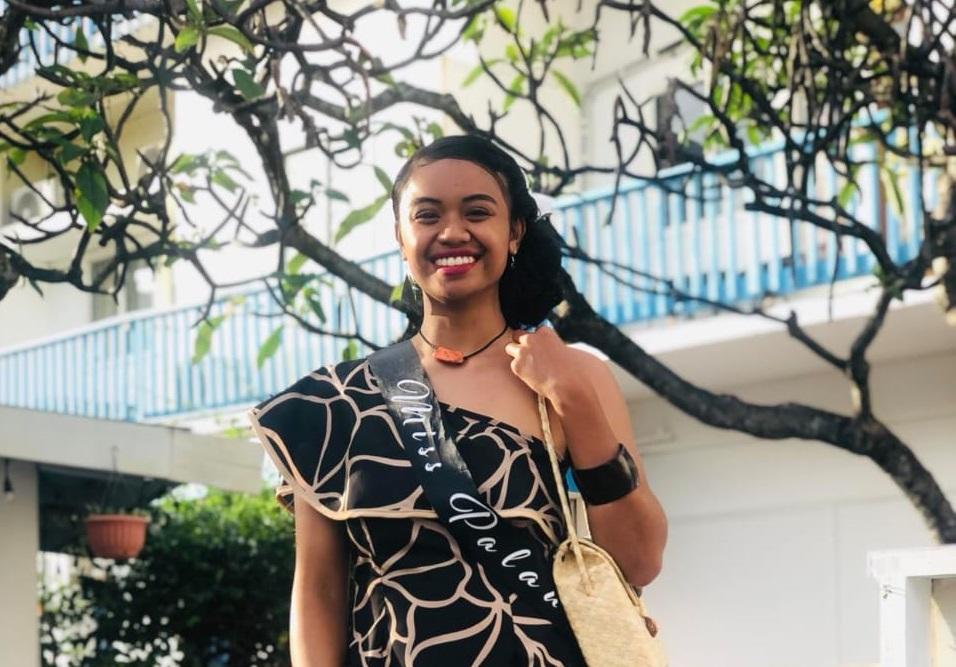
Story
30 May 2024
A childhood moment today, an underwater memory tomorrow
“Rising sea level due to climate change is not caused by the activities of small countries like mine but a result of the actions of bigger countries. While it may not affect them directly, the impact of climate change is affecting our people ten times more.”Kaselehlie! My name is Skylar Clark and this is my story of how rising sea level is slowly swallowing my island home, taking with it my childhood memories and my father’s ancestral home.I am a seventeen-year-old high school student living in Pohnpei, one of the four states in the Federated States of Micronesia (FSM) and every time someone talks about climate change, my heart sinks, just like some of these islands in Micronesia.Let me share a story about Pingelap, an island located around 285km east of Pohnpei with over 140 inhabitants. While we may have heard of countries that will be under water in another 50 years, Pingelap’s fate may unfold sooner, and the situation here is even closer to my heart because both my parents are from this part of Micronesia. My father’s family home is in Pingelap where he grew up, and I visit the island during Summer and Christmas breaks. In the last eleven years I have seen the situation go from bad to worse, the places where my father once used to play are now memories underwater.But the issue around sea level rise does not end here. It is even worse with the current drought conditions affecting FSM. Pingelap is a small island and there are no rivers where people could fetch water from. They only have wells and rainwater. When there is no rain, they depend on wells, and saltwater intrusion is impacting access to drinking water from the wells.Children and families now rely on coconuts as a source of drinking water, but due to the worsening impacts of climate change, I am worried that in another ten years, these coconut trees may not be able to produce enough for people to depend on.Supplies are transported to the island via ship, which only goes there twice a year. If supplies are missed by one ship, people have to wait until another ship is scheduled, which is probably towards the other half of the year. Another way to reach the island is through flights and due to recent instances of plane crashes, now there is very limited access to the island.Things are happening more quickly now than what I used to experience when I was little. Within the last eleven years that I have been visiting the island, I can see that the situation is getting dramatically worse in terms of rising sea level affecting people’s livelihoods. Where once they did not have any climate issues, things are taking disastrous turns as each day unfolds in Pingelap. Dear leaders, this is just one story from one island in Micronesia, but there are many small islands in other countries that may be facing similar issues.If you do not take climate action now, then one day my father will lose the place filled with his childhood memories, I will not have a place to go back to during my school breaks, and my future generation might never know that an island called Pingelap ever existed in the Federated States of Micronesia. , filtered_html
1 of 5
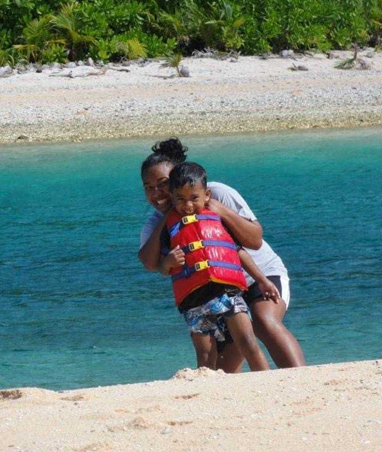
Story
10 June 2024
UN hub reaches remote Pacific islanders: A UN Resident Coordinator blog
The communities of thousands of tiny Pacific islands are the frontline game changers tackling the climate crisis, and a hub based in Micronesia now hosts more than a dozen UN agencies that together are helping address some of their most pressing needs as they battle existential threats like rising sea levels.“They do not want to leave their ancestral places, even if they go under” said Jaap van Hierden.Jaap van Hierden, UN Resident Coordinator in Micronesia | © Eunie KimAppointed by the Secretary-General as the first UN Resident Coordinator for the North Pacific, he oversees ongoing development efforts across a remote region with thousands of small islands comprising of small populations that are the stewards of a vast expanse of ocean and Earth stretching more than 7,000 km from Palau to Kiritimati island. He spoke to UN News just ahead of the Fourth International Conference on Small Island Developing States (SIDS4) which is underway in the Caribbean twin island of Antigua and Barbuda. He explained how the UN Multi-Country Office, known as MCO Micronesia, where 13 UN agencies now operate, was created.Appointed by the Secretary-General as the first UN Resident Coordinator for the North Pacific, he oversees ongoing development efforts across a remote region with thousands of small islands comprising of small populations that are the stewards of a vast expanse of ocean and Earth stretching more than 7,000 km from Palau to Kiritimati island. He spoke to UN News just ahead of the Fourth International Conference on Small Island Developing States (SIDS4) which is underway in the Caribbean twin island of Antigua and Barbuda. He explained how the UN Multi-Country Office, known as MCO Micronesia, where 13 UN agencies now operate, was created. “This mostly undeveloped and rather pristine part of the Pacific is not well known. Except for Palau, these countries are not yet holiday destinations.Apart from receiving some US funding, all five countries in the region – Palau, Federated States of Micronesia, Marshall Islands, Nauru and Kiribati – appear somewhat forgotten and left behind by the global community.This triggered the need for an increasingly effective engagement by Micronesian leaders with the UN and its General Assembly, which in turn led to a review of UN multi-country offices and the subsequent establishment of my post.Frontlines of climate changeUpon my arrival, I quickly learned that Micronesians are at the frontline of climate change with Marshall Islands and Kiribati at risk of disappearing under the waves of our ocean within the lifetimes of our children. Also facing a similar existential risk were the numerous low-lying outer islands of Palau and Micronesia – with its four states of Yap, Chuuk, Pohnpei and Kosrae.Micronesians have been champions in our shared fight against climate change and leaders and advocates in highlighting the importance of reviewing vulnerability through multiple dimensions.They have also contributed to the ongoing “loss and damages” discussion that should help them adapt effectively against rising sea levels and worsening weather events.Encouragingly, they have acted upon their responsibilities as stewards of our vast ocean through the establishment of marine protected areas as well as the UN Educational, Scientific and Cultural Organization (UNESCO) World Heritage Sites and Biosphere Reserves and more.Stewards of the oceanHowever, Micronesians are highly dispersed, with less than half a million in number, all on small islands with small populations, who neither have the economies of scale nor the skills and resources that we find in countries or subregions with a similar geographical expanse. Nevertheless, as stewards of a vast expanse of our ocean and the sea floor, we cannot afford for them to be vulnerable, and I am glad that the UN is stepping up its engagement in Micronesia to ensure that no one is left behind and to ensure that we help build a better future for all.‘Expanding our UN footprint’We quickly learned that our islands were small, with our subregional host, Pohnpei, having only about 30,000 people on island with many having left for education or work in the United States.Yet, we persevered and were able to establish a fully functioning UN MCO Micronesia within two years after arrival in Pohnpei in late 2021. Right now, country coordination offices are in place for Palau, Marshall Islands, Nauru and Kiribati, and a fully functioning Resident Coordinator Office has been established.The new office has enabled UN organizations to initiate the decentralization of their work from Fiji and Samoa to Pohnpei. That resulted in expanding our UN footprint in Pohnpei from five in 2021 to 13 today.‘Being on the ground makes a huge difference’In parallel, I have worked closely with the governments of Micronesia and Pohnpei in setting the stage for the design and construction of the carbon-neutral One UN Micronesia House that incorporates Micronesian history and culture into its' design and landscaping.An undertaking that will include a conference facility will help us in bringing more UN-convened events to Micronesia and allow Micronesian leaders to engage with international leaders and experts on their home ground. We have made good progress with land already allocated by Pohnpei State Legislature, and a launch ceremony for the final design and construction will soon be held.Children pose on the steps of a building in Micronesia | © Eunie KimNot surprisingly, being on the ground makes a huge difference in appreciating and understanding the developmental and humanitarian challenges and opportunities within each of the five Micronesian countries and four states of Micronesia. In order to convey this effectively within our UN team, I travel frequently and engage with government counterparts, embassies, development partners, civil society, faith-based leaders, chambers of commerce and communities.Together, we aspire transformational change that leaves no one behind and helps a better future for all, one in which our planet with its finite natural resources and unique biodiversity is a key stakeholder.” UN Resident CoordinatorThe UN Resident Coordinator, sometimes called the RC, is the highest-ranking representative of the UN development system at the country level.In this occasional series, UN News invites RCs to blog on issues important to the UN and the country where they serve.Learn more about the work of the UN in Micronesia here. , filtered_html
1 of 5
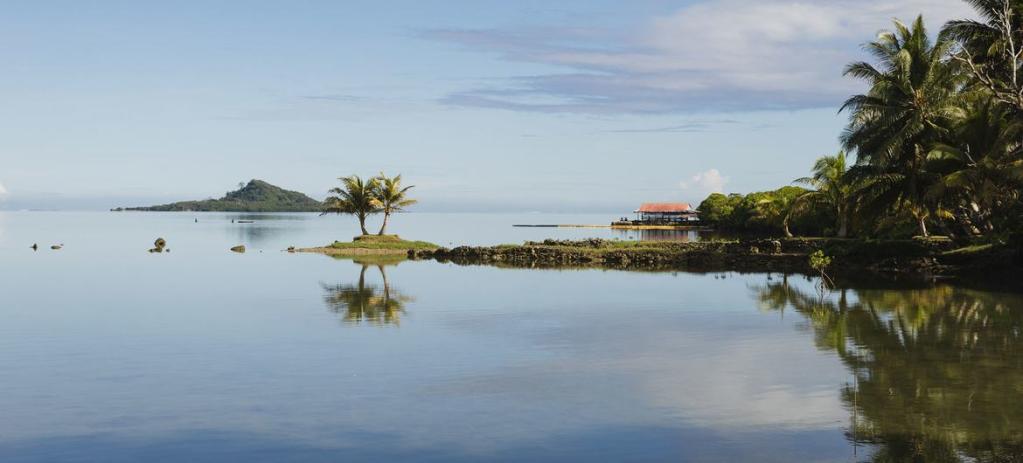
Story
11 March 2024
Agrifood Transformation through Empowering Women in Palau: Combating Challenges and Promoting Sustainable Future
In the beautiful setting of Palau in the Pacific, women stand at the forefront of agriculture, making substantial contributions to food production and the rural economy. Despite their vital role, these women grapple with challenges – limited access to resources, including land and credit, and fewer opportunities for education and training. Traditional gender roles and cultural norms add an additional layer of complexity to their involvement in agricultural activities. However, their dedication shines through, despite facing persistent obstacles.In Palau, particularly in Koror, urbanization and environmental regulations make it difficult to access land for farming. Livestock farming is subsequently banned for environmental and health reasons. Residents of Koror keen on animal husbandry explore land leasing agreements in Babeldaob, which is a 27-minute drive away. Furthermore, farmers, often retirees, utilize pension funds and loans from the National Development Bank of Palau to offset the initial high costs of starting farms.To address these challenges, the Food and Agriculture Organization of the United Nations (FAO) and Global Affairs Canada extend support to the Palauan government. This involves awareness programs and the installation of home biogas systems. A total of 44 farmers, including 22 women farmers received training on the operation, maintenance, and safety measures of home biogas systems.Rosalinda Ongalibang, president of the Palau Livestock Association, appreciates the practical solutions provided by FAO. "Now, I don’t need to purchase costly imported feed or gather firewood; instead, I can get these resources from my own garden," she notes. Rosalinda's positive experience has inspired many farmers in Palau to adopt home biogas, reducing costs and contributing to environmentally friendly practices. This shift not only provides extra income for farmers but also reduces greenhouse gas emissions, minimizes the need for chemical fertilizers, and promotes climate-resilient farming in Palau. Furthermore, to bridge the digital divide, FAO promotes digital solutions through the AgriLink platform under its Digital Village initiative. Agrilink targets 20 women farming groups in Babelbaob, representing over 210 women across 10 states. With digital tools, improved seedling distribution, real-time advisory services, and a commitment to sustainability, AgriLink aims to stimulate comprehensive growth. Through this initiative, FAO envisions a future where women farmers play a central role in shaping a sustainable agricultural landscape. This Women's Day, let's celebrate the resilience and achievements of Palauan women in agriculture, working towards a more empowered and sustainable future. , filtered_html
1 of 5
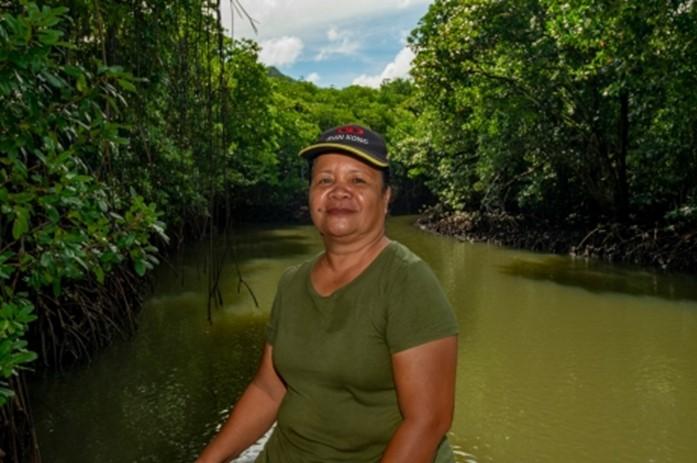
Story
21 October 2023
Establishment of a Maritime Law Enforcement Presence on Kiritimati Island of Kiribati
It may not be commonly known to people around the world that Kiribati possesses the 12th largest Exclusive Economic Zone, with a sea area close to 3.5 million km2 and a coastline of 1,143km. Made up of three distinct island groups - the Gilbert Islands, the Line Islands, and the Phoenix Islands, Kiribati also manages the second largest Marine Protected Area in the Pacific Ocean, known as the Phoenix Islands Protected Area. This partly explains why the country encounters great challenges in ensuring maritime safety and security in its vast waters.
In January 2018, Kiribati faced its worst maritime incident when an overloaded catamaran sank, killing 95 people and sending a strong reminder to the whole region of the importance of maritime safety and law enforcement. What was most alarming at the time was how the ship sank not far from Nonouti - the island where it departed from, but no one was aware until six days later, no distress message was sent, and no emergency locator beacon was activated. The ship also never reported its location, so there was little information for the search and rescue team to work on, given the huge search area[1]. This real-life tragedy emphasizes Kiribati’s strong need for adequate maritime equipment and Maritime Domain Awareness (MDA) technology to help the country effectively monitor and address maritime issues in its waters.
For this reason, the Global Maritime Crime Programme (GMCP) of the United Nations Office on Drugs and Crime (UNODC) has been working with Kiribati and other Island Countries in the Pacific to strengthen their maritime law enforcement capabilities, as well as regional coordination and maritime cooperation. In a recent site inspection visit to Tarawa of Kiribati, GMCP found that there is limited and irregular maritime law enforcement presence across the Line Islands group, making this area extremely vulnerable to maritime criminality. Currently, the Maritime Unit under Kiribati Police Service is responsible for law enforcement at sea, and is based in the capital city of Tarawa, while the country’s 33 islands extend all across the Pacific. Hence, in order to enhance the Police Maritime capabilities in other regions, GMCP is supporting the Kiribati Police Service establish a Police Maritime Unit on Kiritimati Island (Christmas Island). Notably, this island lies at the most eastern part of the country; thus, the establishment of a Police Maritime Unit on Kiritimati Island will for the first time ever provide a permanent presence of maritime law enforcement in the Line Islands region.
A current initiative being supported by UNODC GMCP under this project is to deliver an air-conditioned Shipping Container Office Space and Marine Band VHF Transceiver and Antenna to Kiritimati Island to establish the maritime outpost. This has been a challenging endeavour given the remote location of the island, but GMCP is committed to implement the project and prove its ability in delivering support activities in the remotest parts of the Pacific Ocean.
In the next phase of the project, GMCP plans to install a terrestrial Automatic Identification System (AIS) Receiver on Kiritimati and link it to the maritime surveillance centre in Tarawa. This low-cost solution will help maritime law enforcement agencies in Kiribati effectively locate an AIS-transmitting vessel, trace the routes of the vessel, and detect irregularity in the vessel’s behavior patterns through the use of AIS satellite-based data. The AIS satellite system also provides global coverage, therefore, it can prove to be useful for Pacific island countries like Kiribati with a large Exclusive Economic Zone. AIS data not only helps maritime law enforcement agencies quickly locate vessels of interest, but also supports in the detection of ‘dark’ vessels that purposely turn off their signal. This can provide law enforcement agencies with valuable information with regards to vessels that may be engaging in illicit activities, such as those related to drug trafficking in the Pacific.
Through the delivery of these initiatives, GMCP aims to enhance the MDA and maritime law enforcement capabilities of Kiribati and other island countries to timely address incidents at sea, while also effectively countering maritime crime across the Pacific region.
[1] Litany of failures led to Kiribati ferry tragedy - inquiry report. Radio New Zealand, 8 Oct 2019.
, filtered_html
1 of 5
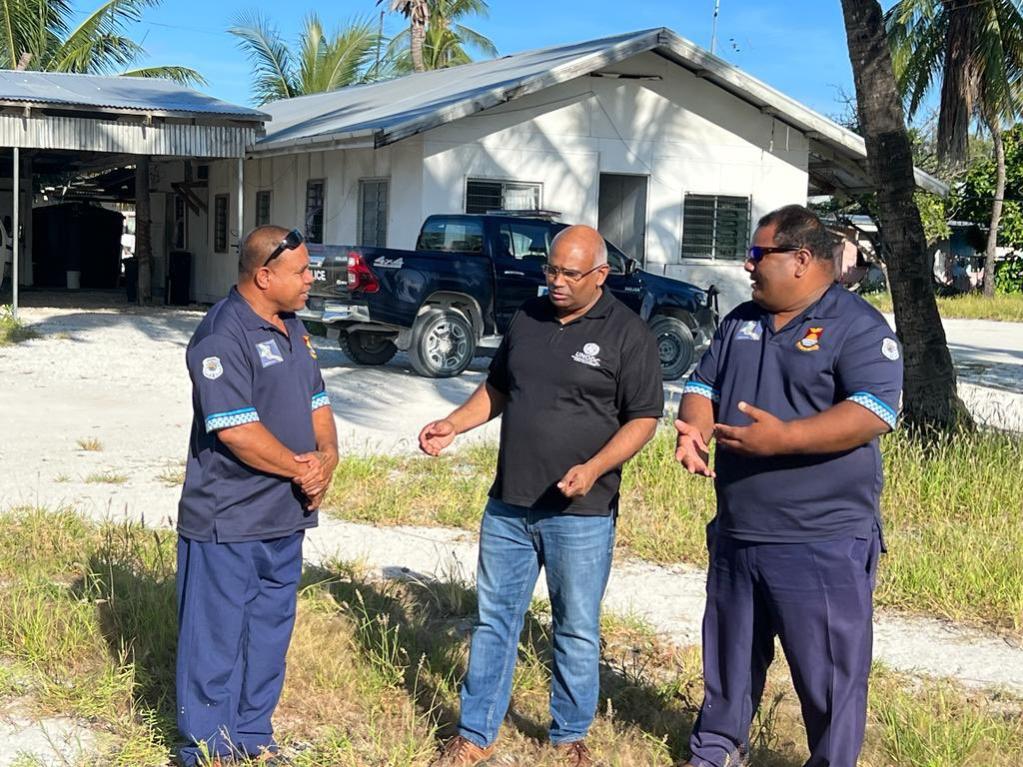
Press Release
13 April 2025
Tonoas Smart Island Digital Hub Officially Launched, Marking a New Era of Digital Transformation in Micronesia
Funded by the UN SDG Fund and hosted by the International Telecommunication Union (ITU) with support from the United Nations Office for Project Services (UNOPS) and the UN Resident Coordinator’s Office Multi-Country Office (UNRCO MCO), the event celebrated the successful deployment of a cutting-edge digital hub designed to bridge the digital divide in one of FSM’s most remote communities. Equipped with state-of-the-art connectivity infrastructure, the Tonoas Digital Hub is already operational, empowering the community with tools to overcome geographic isolation and limited resources. The initiative, a cornerstone of the FSM Smart Island Project, reflects a collaborative effort to foster digital inclusion, resilience, and economic opportunity, setting a precedent for sustainable development across Micronesia’s outer islands.At the launch, H.E. President Wesley W. Simina emphasized, “This Smart Island initiative is a symbol of what’s possible when technology, community, and partnership come together. It’s a cornerstone of our vision for a more connected, more unified Micronesia.”Mr. Tapan Mishra, UN Resident Coordinator, highlighted that the Digital Hub holds the power to transform lives by expanding access to education, skills development, and opportunities, particularly for young people. He encouraged the community to fully embrace this potential to build a more inclusive, empowered, and prosperous future for the FSM.Dr. Cosmas Luckyson Zavazava, Director, ITU Telecommunication Development Bureau, remarked, "The newly launched digital hub in Tonoas Island, within the Federated States of Micronesia, will provide the community with vital access to digital services and skills-building opportunities, ensuring that no one is left behind. We thank all of our partners for their collective efforts, which have made it possible to bring digital transformation to even the most remote communities."“UNOPS is committed to supporting FSM in building resilient and sustainable digital infrastructure,” added Mr. Tokumitsu Kobayashi, UNOPS Pacific Small Island Developing States Advisor. “By investing in connectivity and capacity-building, we are helping to lay the foundation for long-term social and economic benefits for the people of Tonoas. The next important issue that we should seek is to roll out this pilot case to other islands in FSM. ”The successful launch of the Tonoas Digital Hub—already enabling access to telemedicine, online learning, financial services, and local governance—demonstrates the tangible impact of digital innovation in enhancing community resilience. This initiative serves as a model for smart island development and aligns with the missions to build sustainable communities and improve lives through peace and sustainable development.ENDS About UNOPSUNOPS' mission is to help people build better lives and countries achieve peace and sustainable development. We help the United Nations, governments, and other partners manage projects and efficiently deliver sustainable infrastructure and procurement. Read more at www.unops.org and follow UNOPS on Facebook, Twitter, Instagram, LinkedIn, YouTube, and WhatsApp.About ITUThe International Telecommunication Union (ITU) is the United Nations agency for digital technologies, driving innovation for people and the planet with 194 Member States and a membership of over 1,000 companies, universities, civil society, and international and regional organizations. Established in 1865, ITU coordinates the global use of the radio spectrum and satellite orbits, establishes international technology standards, drives universal connectivity and digital services, and is helping to make sure everyone benefits from sustainable digital transformation, including the most remote communities. From artificial intelligence (AI) to quantum, from satellites and submarine cables to advanced mobile and wireless broadband networks, ITU is committed to connecting the world and beyond. Learn more: www.itu.intAbout the Joint SDG Fund:The Joint Sustainable Development Goals (SDG) Fund is an innovative instrument to incentivize transformative policy shifts and stimulate the strategic investments required to get the world back on track to meet the SDGs. Read more:www.jointsdgfund.org
, filtered_html
, filtered_html
1 of 5
Press Release
11 April 2025
A Milestone for Justice: Spotlighting the Importance of Judicial Well-being
From Pacific Vision to Global ActionThis resolution is the culmination of a global effort that first gained ground in the Pacific. Sparked by an idea from Justice Rangajeeva Wimalasena, the President of the Court of Appeal of Nauru in 2023, the initiative gained momentum through extensive collaboration with diverse stakeholders, including UNODC, members of the Global Judicial Integrity Network. The result was the Nauru Declaration on Judicial Well-being, composed by nearly 20 judicial leaders and stakeholders from Canada and Ukraine to the Caribbean, Singapore and beyond. Adopted in Nauru on 25 July 2024, the Declaration highlights the urgent need to address the physical, mental, and emotional health of judges – without which independence, impartiality, and integrity cannot thrive.Why Judicial Well-being MattersJudges carry immense responsibility, with their decisions shaping lives, communities, and generations to come. Indeed, the judiciary plays a fundamental role in safeguarding vibrant democratic societies, alongside the legislative and executive branches of government. However, this responsibility comes with pressure, isolation, and even threats to judges’ safety, which could have severe repercussions on their lives. According to a study by UNODC’s Global Judicial Integrity Network, which gathered responses from participants in 102 countries, 76% of judges and members of the judiciary do not maintain optimal physical and mental well-being, often due to massive workloads, burnout or stigma around judicial stress. The Nauru Declaration and the UN resolution recognizes this and advocates for systemic support for judges, reinforcing that judicial well-being is not a privilege – it is a necessity for strong, independent legal systems.The Declaration draws from a wealth of international documents and practices that call for the safeguarding of judicial integrity. For example, the Bangalore Principles of Judicial Conduct emphasize competence, diligence, and integrity as critical for the protection of democracy and human rights. And Article 11 of the United Nations Convention against Corruption (UNCAC) likewise highlights the role judicial integrity plays in tackling corruption. A judiciary that is supported and resilient is far better equipped to resist undue influence and maintain public trust – and this resilience is rooted in the well-being of justices.“When I began efforts to help judges manage stress and achieve a balanced mind, judicial well-being was barely recognized, often met with scepticism, and considered a taboo topic,” said Justice Wimalasena. “I realized that judicial stress is a global issue affecting both small and large judiciaries. Today, I am hopeful that the seven principles enshrined in the Nauru Declaration on Judicial Well-being will serve as a global catalyst, empowering judiciaries to support their judges in delivering quality justice.”What Comes Next?The adoption of the UN resolution is only the beginning. UNODC is committed to continuing its support for judicial well-being through practical tools, resources, and dialogue. A significant next step is the International Conference on Judicial Integrity and Well-being, set to take place in Papua New Guinea in August 2025. This event will build upon the momentum of the Nauru Declaration, bringing together judicial leaders, policymakers, and experts to turn commitments into concrete steps.The road to stronger, healthier judiciaries is a shared responsibility and an integral component of SDG 16: Peace, Justice and Strong Institutions, which aims to provide access to justice for all and build effective, accountable and inclusive institutions at all levels. As we mark 25 July on our calendars, let it be more than just a day of acknowledgment. Let it be a rallying cry for ensuring that those who protect justice are, in turn, protected themselves.For more on the Nauru Declaration and the movement for judicial well-being, visit:UN General Assembly Resolution on International Day for Judicial Well-beingNauru Declaration on Judicial Well-beingUNODC Report on Judicial Well-beingJudicature Duke Article, filtered_html
1 of 5
Press Release
10 February 2025
UN Agencies and FSM Government Launch Joint Programme to Accelerate SDG Implementation
UNOPS, in collaboration with UN Global Pulse, ESCAP and the Government of the Federated States of Micronesia (FSM), has launched the “Advancing SDGs Monitoring and Governance to Accelerate Implementation” joint programme. Led by the UN Resident Coordinator in Micronesia, with the UN Resident Coordinator’s Office serving as the focal point, this initiative is funded by the UN Sustainable Development Group and aims to strengthen local governance while enhancing FSM’s capacity to monitor and implement the Sustainable Development Goals (SDGs). Through innovative solutions and large-scale capacity building, the project will equip FSM’s local governments with advocacy tools, digital monitoring solutions, and improved governance frameworks to localize and accelerate SDG achievement.Photo courtesy of UNOPS. Strengthening Local Governance Through Capacity Building and Digital InnovationThe joint programme will focus on empowering FSM’s state and local governments to take a leading role in SDG implementation by combining advocacy, governance improvements, and digital transformation.The initiative will:Enhance stakeholder advocacy capacity by training local government officials, personnel, and community leaders across FSM’s four states to champion local SDG action.Strengthen partnerships between state governments and civil society organizations to promote inclusive, participatory SDG advocacy.Develop a data-driven digital solution to track SDG progress, enhance policy decisions, and improve the effectiveness of development investments.A Collaborative Effort to Drive SDG ProgressThis joint programme reflects a strong partnership between the FSM Government and UN agencies, reinforcing their shared commitment to accelerating sustainable development through governance innovation, digital transformation, and strengthened stakeholder engagement."This project is a major step forward in equipping local governments with the tools and data they need to lead sustainable development efforts," said Gemma Marie I. Carnacete, UNOPS Project Manager. "By working together and embracing digital innovation, we’re setting the stage for real, lasting progress in SDG implementation.""Pacific SIDS face unique challenges in localizing the SDGs, from resource constraints to climate vulnerabilities. Strengthening local governance and building capacity at the state levels is critical to ensuring that sustainable development is both inclusive and effective. Through this Joint SDG Fund project, we aim to bridge the gap between global commitments and local action, linking FSM’s efforts to broader regional processes that drive resilience and prosperity across the Pacific." said Andie Fong Toy, Head of ESCAP’s Pacific Office.“Through this joint programme, we are grateful for the opportunity to collaborate with the UN network in supporting the government of FSM to co-develop technology-enabled solutions that are aligned with their needs. By supporting a user-centred and data-informed approach, we aim to enhance SDG implementation in ways that are meaningful and sustainable.” said Ahmed El Saeed, Regional Head of UN Global Pulse Asia Pacific.By investing in local governance, multi-stakeholder collaboration, and digital solutions, FSM is taking a major step toward ensuring effective SDG implementation and long-term development impact.**ENDS** About UNOPSUNOPS mission is to help people build better lives and countries achieve peace and sustainable development. We help the United Nations, governments and other partners to manage projects, and deliver sustainable infrastructure and procurement in an efficient way. Read more at www.unops.org and follow UNOPS on Facebook, Twitter, Instagram, LinkedIn, YouTube and WhatsApp. About ESCAPThe Economic and Social Commission for Asia and the Pacific (ESCAP) is the most inclusive intergovernmental platform in the Asia-Pacific region. The Commission promotes cooperation among its 53 member States and 9 associate members in pursuit of solutions to sustainable development challenges. ESCAP is one of the five regional commissions of the United Nations. The ESCAP secretariat supports inclusive, resilient and sustainable development in the region by generating action-oriented knowledge, and by providing technical assistance and capacity-building services in support of national development objectives, regional agreements and the implementation of the 2030 Agenda for Sustainable Development. About UN Global PulseUN Global Pulse is the Secretary-General’s Innovation Lab. We work at the intersection of innovation and the human sciences to inform, inspire and strengthen the ability of the United Nations family and those it serves to anticipate, respond and adapt to the challenges of today and tomorrow., filtered_html
1 of 5
Press Release
13 December 2024
Op-ed: Time to Act Now: Ending Violence Against Women in the Pacific
“Every 11 minutes, a woman is killed”Globally, every 11 minutes, a woman is killed—an alarming and heart-wrenching statistic that underscores the global epidemic of gender-based violence (GBV). The International Day for the Elimination of Violence Against Women, observed on November 25, reminds us of this crisis and challenges us to act with urgency. This day also launches the annual 16 Days of Activism, calling for a united stand to confront violence against women and girls.Violence against women remains a staggering global injustice. One in three women worldwide experiences physical or sexual violence, usually at the hands of an intimate partner. These are not just numbers; they represent the lived experiences of women—daughters, mothers, friends—whose safety, dignity, and potential are stolen by violence.The Pacific paints an even grimmer picture. Violence against women and girls here is among the highest in the world—double the global average. This violence tears at the fabric of our communities, undermines development, and stifles our collective efforts to address critical challenges like the climate crisis. How can we truly achieve sustainable development when half the population faces such profound threats to their well-being and rights?The Urgency for ChangeThis year's UNITE Campaign amplifies a powerful message: the time for complacency and empty promises has passed. To end violence against women, we must confront its root causes—harmful social norms, entrenched gender inequalities, and systems of impunity that allow perpetrators to escape accountability.In the Pacific, systemic change begins with coordinated, survivor-centered responses. Governments must establish and fund comprehensive, multi-sectoral mechanisms to address GBV. Essential services—healthcare, legal aid, psychosocial support, and safe shelters—must be accessible and adequately resourced. Yet, services alone are not enough. We must also dismantle societal norms that condone violence and cultivate a culture of equality and respect.In the Pacific, the EU-funded UN Spotlight Initiative, launched in 2020, focused on country-specific commitments to end domestic and intimate partner violence across the Pacific. Implemented by UNDP, UNICEF, UN Women, UNFPA, and IOM, the Initiative in the Pacific supported the strengthening of laws, policies, and institutional capacities aligned with international human rights standards. It promoted behavior change to tackle harmful social norms, empowered women’s organizations and civil society, and enhanced survivor-centered support services, including legal aid, healthcare, and safe spaces. The initiative focused on evidence-based approaches by improving data collection and analysis while addressing the unique cultural contexts of Pacific Island nations. Through regional collaboration and community engagement, it fostered sustainable, inclusive solutions to prevent violence and advance gender equality. A Call to Action: From Awareness to AccountabilityAs we approach the 30th anniversary of the Beijing Declaration and Platform for Action in 2025, it is clear that the fight for gender equality and the eradication of GBV requires collective commitment. Governments must strengthen legal frameworks, enforce protections, and hold perpetrators accountable. But governments cannot do it alone. Civil society, businesses, communities, and individuals all have critical roles to play.The United Nations remains steadfast in its commitment to work with governments and civil society to dismantle the structural barriers that perpetuate GBV. Our approach is rooted in human rights: addressing root causes, empowering survivors, and amplifying the voices of women and girls.As individuals, we are not powerless. Each of us can be an ally—supporting survivors, participating in local campaigns, challenging harmful norms, and advocating for systemic change. A Better Future Is Within ReachThe road ahead is long, but not insurmountable. By standing together, supporting CSO and NGOs, and holding perpetrators accountable, we can create a world where every woman and girl is free from violence and fear. Let this not just be a moment of reflection, but a call to action.The time to act is now. The United Nations stands in solidarity with the Pacific’s women and girls, and we urge every individual, every community, and every government to join us in this fight. Together, we can build a future where violence against women is a thing of the past—because no woman should ever live in fear, and no girl should ever grow up thinking violence is her fate. , filtered_html
1 of 5
Press Release
20 November 2024
Pacific Voice Raised for Climate-Resilient Infrastructure at COP29
17 November, Baku, Azerbaijan - UNOPS successfully hosted a panel discussion, "Building Climate-Resilient Infrastructure in the Pacific", at the Coalition for Disaster Resilient Infrastructure (CDRI) Pavilion during COP29. This session focused on pioneering strategies to address the urgent infrastructure challenges faced by Small Island Developing States (SIDS) in the Pacific. Pacific SIDS are at the forefront of the global climate crisis, grappling with rising sea levels and increasingly severe weather events that threaten vital infrastructure, economies, and communities. The session highlighted innovative approaches undertaken through a partnership between UNOPS, CDRI, and the Republic of the Marshall Islands to build resilience in health and coastal infrastructure. Central to the discussion was the “Roadmap for Health and Coastal Infrastructure Resilience” project, which leveraged cross-sector collaboration, inclusive planning, and data-driven insights to mitigate vulnerabilities. The panel explored replicable strategies, best practices, and actionable insights to enhance resilience not only in the Pacific but also in other climate-vulnerable regions.Moderated by Kajsa Hartman, Head of UNOPS Nairobi Liaison Office (a.i.), the session featured experts, officials, and youth representatives with a shared commitment to climate action. Ramraj Narasimhan, Senior Director of Program Management & Technical Support, CDRI, shared his insights, that “Pacific SIDS are highly vulnerable to disasters. Through the Infrastructure for Resilient Island States (IRIS) programme, CDRI is collaborating with these nations on knowledge and tools to strengthen the disaster resilience of their critical infrastructure, thereby protecting lives and livelihoods. Such efforts include projects like the National Surveys for Infrastructure Resilience Geospatial Databases, where, together with the Pacific Community, CDRI is partnering with the governments of Vanuatu, Kiribati and Tonga to create an accessible and centralized database of hazards and infrastructure assets to inform effective early warning systems. We remain dedicated to expanding this support to benefit even more SIDS and will announce a second cohort of projects to be funded, including some in the Pacific, at COP29.” Simonetta Siligato, UNOPS Asia Pacific Senior Advisor, showcased UNOPS contributions to advancing climate-resilient infrastructure in the Pacific. “UNOPS has been actively applying our expertise, working closely with partners like CDRI and local governments in the Pacific. Our joint efforts in the Marshall Islands and Kiribati are great examples of how we’re bringing together cross-sector knowledge, technical expertise, and data-driven approaches to create tangible solutions that can withstand climate threats.” Luna-Rossa Lomitusi, Youth Representative and Climate Advocate from Samoa, concluded the session with her vision for a resilient Pacific by 2050. “Building resilient infrastructure is not just about strengthening physical structures; it is about safeguarding our communities, preserving our natural environments, and ensuring the continuity of essential services. It provides the foundation for economic stability, food security, and social well-being, all of which are vital for the sustainable development of Pacific nations. Practical capacity-building support is equally critical, equipping Pacific communities with the skills and knowledge needed to effectively maintain and adapt this infrastructure, ensuring its longevity and enhancing local resilience. Together, these efforts lay the groundwork for a brighter, more resilient Pacific by 2050, where our communities thrive in the face of climate challenges.” The session offered a unique platform to explore how innovative partnerships and strategic investments can drive climate adaptation and infrastructure resilience in some of the world’s most vulnerable regions. An interactive Q&A session further fostered a dynamic exchange of ideas and insights, providing valuable perspectives from the audience. ENDS
About UNOPSUNOPS mission is to help people build better lives and countries achieve peace and sustainable development. We help the United Nations, governments and other partners to manage projects, and deliver sustainable infrastructure and procurement in an efficient way. Read more: www.unops.org About CDRIThe Coalition for Disaster Resilient Infrastructure (CDRI) is a partnership of national governments, UN agencies and programmes, multilateral development banks and financing mechanisms, the private sector, and knowledge institutions that aims to promote the resilience of new and existing infrastructure systems to climate and disaster risks in support of sustainable development. Read more: www.cdri.world , filtered_html
About UNOPSUNOPS mission is to help people build better lives and countries achieve peace and sustainable development. We help the United Nations, governments and other partners to manage projects, and deliver sustainable infrastructure and procurement in an efficient way. Read more: www.unops.org About CDRIThe Coalition for Disaster Resilient Infrastructure (CDRI) is a partnership of national governments, UN agencies and programmes, multilateral development banks and financing mechanisms, the private sector, and knowledge institutions that aims to promote the resilience of new and existing infrastructure systems to climate and disaster risks in support of sustainable development. Read more: www.cdri.world , filtered_html
1 of 5
Latest Resources
1 / 11
Resources
12 December 2024
1 / 11


